Earned media — the unpaid press coverage or publicity a brand receives from a third party — is a more cost-effective marketing strategy than paying for advertising, one that helps brands build up their reputation and boost awareness.
But generating earned media isn’t easy: Brands can’t force journalists to cover them, nor can they compel people to talk about them on social media. So it helps to think outside the box.
That’s exactly what Recess did when it opened a Manhattan pop-up shop complete with mirrored walls and neon lights. While the retail space’s rent wasn’t free, the attraction gained plenty of publicity from local news outlets and national publications. This was no accident.
“Everything we do at Recess is about generating earned media,” Recess CEO Benjamin Witte told Built In. “The focus has been to create our own content and experiences that are very shareable, and I think that’s what’s driven a lot of our awareness.”
You don’t have to open your own pop-up shop to grab media attention, but you do need to find creative, cost-efficient ways to get your brand in front of consumers.
For inspiration, we’ve compiled a list of 10 examples where companies seized opportunities to generate earned media.
Earned Media Examples
- Oreo wins the marketing super bowl.
- Ocean Spray riffs on a TikTok video.
- Porch shares its original research.
- Home Depot gets into the spooky spirit.
- Ahrefs CMO taps into the power of podcasts.
- Burger King drops a hint by liking old tweets.
- Simulate satisfies the cravings of a supermodel.
- MSCHF reimagines The Office on Slack.
- Steak-umm turns Twitter on its head with cultural commentary.
- Hint Water hijacks the drink preferences of an influencer.
10 Earned Media Examples
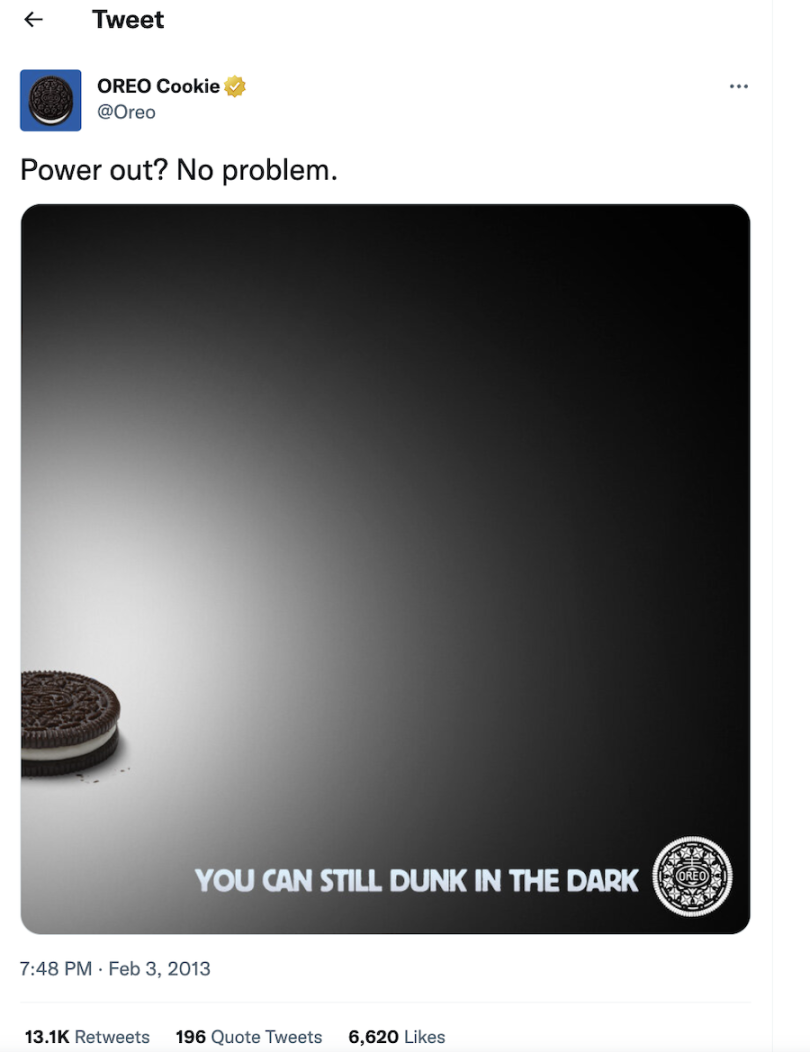
1. Oreo Steals the Spotlight With Super Bowl Tweet
When Super Bowl XLVII halted for over half an hour because of the stadium’s power outage, the creative agency working for Oreo published a tweet that read, “You can still dunk in the dark.” It quickly went viral, racking up thousands of social shares and earning coverage in outlets like HuffPost and Wired, which said Oreo won the ‘Marketing Super Bowl.’
2. Ocean Spray Capitalizes on Viral TikTok Video
Ocean Spray didn’t pay — nor plan — for the viral TikTok video in which Nathan Apodaca sipped from a bottle of Ocean Spray while he rode his skateboard and vibed out to Fleetwood Mac’s “Dreams.” But the juice brand wasted no time grabbing additional headlines by gifting Apodaca a new truck, as a way to say thanks, and by creating its own viral video in which Ocean Spray’s CEO paid homage to Apodaca’s original TikTok.
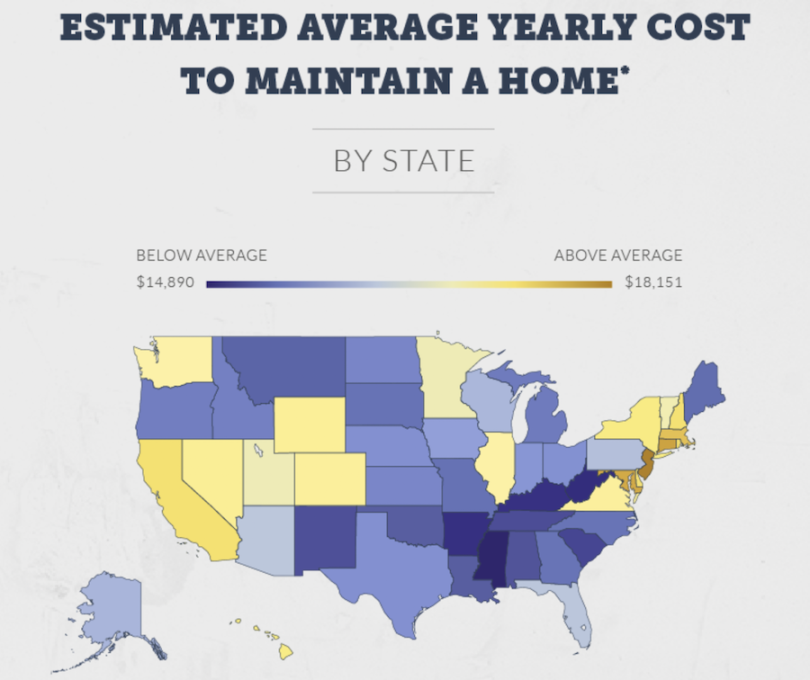
3. Porch Shares Original Research
The home repair company used internal data to figure out which ZIP codes in each state spent the most on home maintenance and which specific repairs were the most expensive. Then it packaged its findings into an infographic and pitched it to publications, positioning it as data that readers would find interesting and useful. Ultimately, the effort earned Porch 188 pieces of coverage, in places like the Washington Post, and has made it a reliable reference source for publications like The Balance.
4. Home Depot Sells a Giant Skeleton
Leading up to Halloween in 2020, Home Depot created and promoted a new decorative item: a 12-foot-tall skeleton sculpture. Not only did the skeleton quickly sell out, but it also went viral on social media, surged on organic search and was the subject of satirical articles. Plus, Home Depot executives told Insider that 2020’s Halloween was “the strongest we’ve ever had,” demonstrating that making highly memeable items pays off.
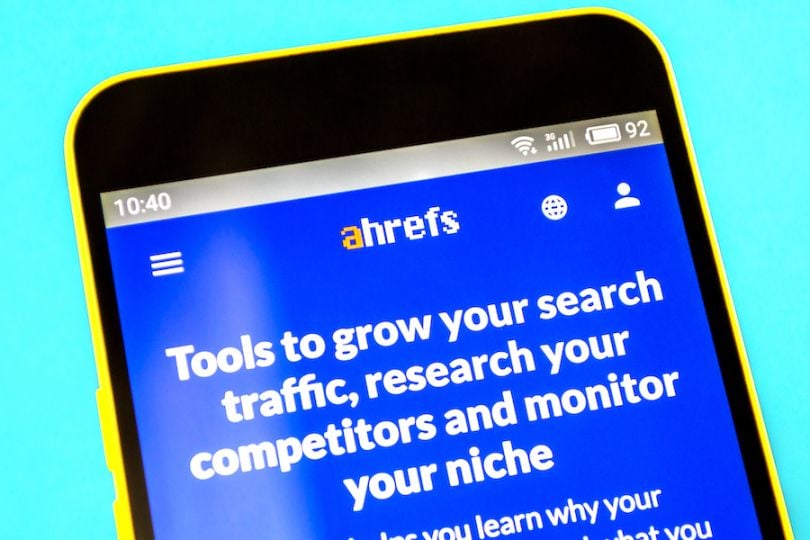
5. Ahrefs Lands Guest Podcast Appearances
Tim Soulo, the CMO of Ahrefs, which makes search engine optimization tools, achieved his 2019 goal of appearing as a guest on 20 podcasts. He wrote on Medium that he did it as an easy way to get brand exposure: The total commitment time is roughly two hours per episode, but “in exchange, you get to put yourself (your ideas, your product, your business) in front of thousands of potential customers.”
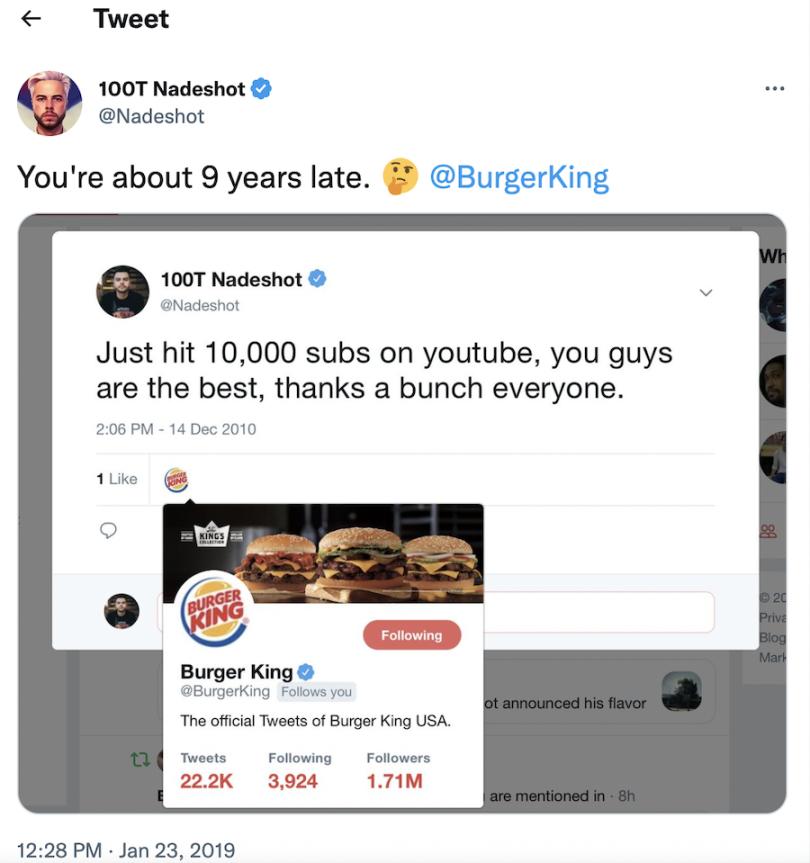
6. Burger King Likes Old Tweets to Celebrate a Product’s Return
In 2019, Burger King’s Twitter account began furtively liking decade-old tweets of various celebrities and influencers. No one knew why. People puzzled over it and speculated about what it meant (resulting in lots of social media engagement). Until finally, Burger King revealed its intentions: “Some things from 2010 are worth revisiting,” the company tweeted. “Like your old tweets, and funnel cake fries. Get them now for a limited time.”
7. Simulate Sends Limited-Edition Nuggets to a Supermodel
Simulate, maker of plant-based nuggets, sold out of its limited-edition “spicy nuggs” shortly after they went on sale. But when the company noticed supermodel Bella Hadid expressing disappointment for missing out on the sale in its Instagram comments, it quickly sent her boxes of it. Then she made an Instagram story about them — for her 44.4 million followers to see.
8. MSCHF Drops ‘The Office’ Slack
The Brooklyn-based collective MSCHF, which specializes in making viral products, released for a limited time access to a Slack-channel-based retelling of the television series The Office in its entirety. The gag was covered by Wired, Vice, The Verge, Forbes, AV Club and several other publications, earning MSCHF plenty of attention to harness for other monetizable products down the road.
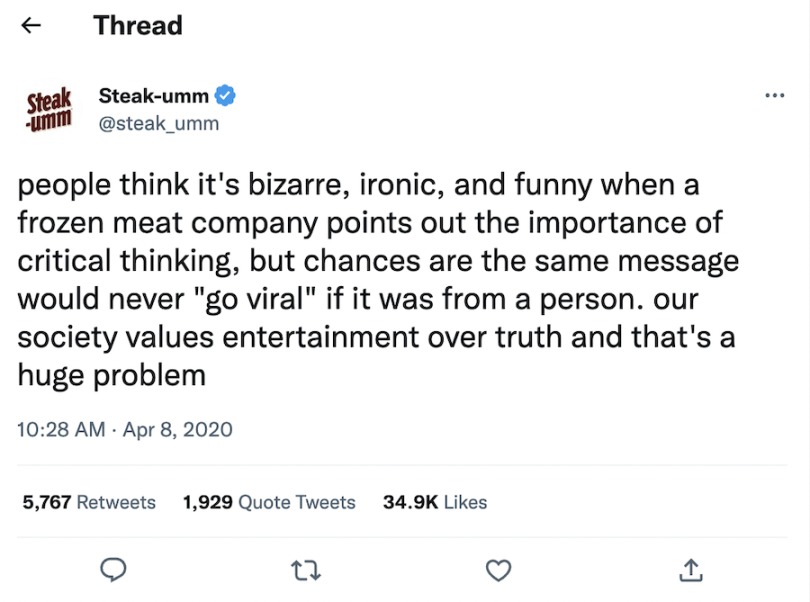
9. Steak-umm Writes Deep Tweetstorms
The frozen beef brand Steak-umm rose from obscurity into something of a minor social media celebrity after its Twitter account began waxing philosophical about various cultural issues. Along with increased social engagement and visibility, the company’s sales rose nearly 15 percent the year after social media manager Nathan Allebach took over, and the brand’s social media presence got mentioned by the New York Times.
10. Hint Water Sends Product to YouTube Influencer
While influencer marketing isn’t the same thing as generating earned media, some brands send free products to tastemakers with the hope that they’ll give it a review or a shoutout if they like it. That’s what brand advisor and investor Nik Sharma did for his client Hint Water. Sharma sent over a hundred bottles of peach-flavored water to YouTuber Sara Dietschy, leading to the brand eventually becoming a sponsor of Dietschy.




